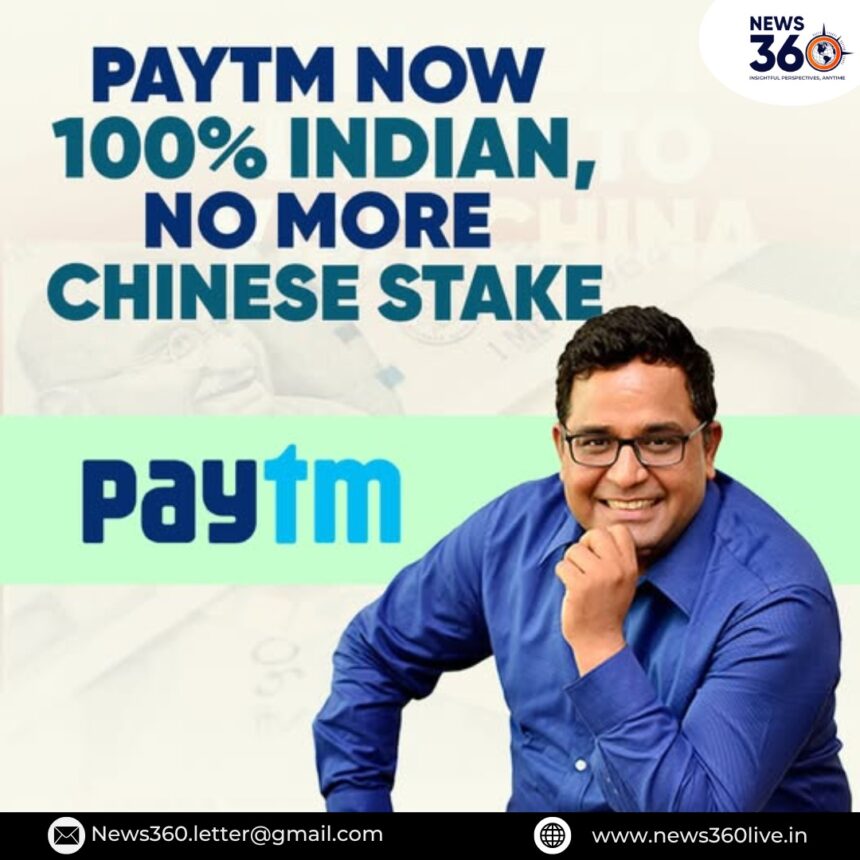Paytm, a household name in India’s digital payment landscape, has recently undergone a monumental transformation: it is now 100% Indian-owned. This significant development marks the complete divestment of any remaining Chinese stake. It’s a crucial milestone with far-reaching implications for India’s burgeoning digital economy and its pursuit of self-reliance. This article delves into the multifaceted aspects of this ownership change. We will explore its impact on national security, economic sovereignty, and the future of digital payments in India.
The transition to full Indian ownership signifies more than just a change in shareholding. It represents a strategic recalibration. This move empowers India to exert greater control over its digital infrastructure and financial technologies. As India continues its journey towards becoming a global digital powerhouse, understanding the nuances of such ownership shifts becomes paramount. It helps us appreciate the nation’s commitment to building a robust and secure digital ecosystem, free from foreign influence.
The Journey to 100% Indian Ownership: What Led to This Change?
Unpacking the Divestment: A Step-by-Step Look at the Ownership Transition
Paytm’s path to becoming 100% Indian-owned wasn’t a sudden event. It involved a planned series of steps. Over time, various Chinese investors reduced their share in the company. This process unfolded with careful transactions. Eventually, all foreign stakes were removed. This meant a gradual shift in who held the power. The last pieces of Chinese ownership finally sold off, marking a big change for Paytm.
The Role of Regulatory Shifts and National Interest
Government policies played a big part in this change. India has shown a clear preference for local control in important sectors. Fintech, or financial technology, is one such area. Rules about foreign investment have tightened over recent years. These changes aimed to boost national security. They also focused on keeping sensitive data within India’s borders. This push for local ownership aligns with India’s larger goals.
Key Investors Driving the Indian Takeover
Several Indian investors stepped up to acquire the remaining stakes. These investors believed in Paytm’s future and India’s digital mission. Their involvement underscores a strong commitment to growing a truly Indian platform. These local backers see a bright future for Paytm under full Indian control. They want to make sure the company serves India’s people and economy first.
Impact on India’s Digital Economy and Self-Reliance
Strengthening India’s Digital Sovereignty
Full Indian ownership gives India more say over its digital money systems. This means vital financial data stays home. It lessens any risks from outside influences. Digital sovereignty is about a nation’s ability to control its digital space. With Paytm being 100% Indian, India strengthens its hold on a key part of its digital world. This is good for national security and keeps user data safer.
Fueling Indigenous Innovation and Growth
An Indian-owned Paytm can now focus more on local needs. This shift can boost new ideas from within India. It supports Indian engineers and tech experts. The company can tailor its services exactly for the Indian market. This leads to more jobs and chances for local talent to shine. It helps India build its own strong tech industry, powered by local brainpower.
A Boost for Financial Inclusion and Digital Payments
Paytm’s new status helps it better serve India’s goal of including everyone in the digital economy. A fully Indian company can understand local communities better. It can create services for those who don’t often use banks. This means more people in small towns and villages can access digital payments. It helps bring digital money to every corner of the country. This makes financial services easy for many more people.
Security, Data Privacy, and Consumer Trust
Enhanced Data Security and Privacy Measures
With Paytm now fully Indian, data security can get even better. The company will follow India’s data protection laws strictly. This means your personal information is less likely to leave India. It creates stronger rules for keeping your money and data safe. Indian ownership reduces worries about data being handled by foreign entities. This gives users more peace of mind.
Rebuilding and Reinforcing Consumer Confidence
Many people care about where their data is stored. They want to know who controls their money apps. The news of Paytm becoming 100% Indian can make users trust it more. It shows the company is committed to India’s rules and its people. This change can erase any old worries. It helps build a stronger bond between Paytm and its users.
Expert Perspectives on Data Governance in Fintech
Experts often talk about how important local ownership is for digital finance. They say it makes it easier to enforce local data laws. When a company is fully domestic, it’s simpler to hold it accountable. This setup helps secure financial data for everyone. Many agree that this move is a positive step for data governance in India.
Future Outlook for Paytm and the Indian Fintech Landscape
Paytm’s Strategic Vision Post-Divestment
Paytm is now free to set its own path, guided by Indian goals. Expect new products and services tailored for local users. The company might focus on growing in new areas of India. Its vision will likely center on innovation and user experience. This new phase could see Paytm become even more central to daily Indian transactions.
The Competitive Landscape and Other Fintech Players
This change will stir things up for other digital payment companies in India. Paytm’s fully Indian status gives it a unique edge. Other players might need to adjust their own strategies. The market could see more competition focused on local appeal. This is good for consumers as companies will work harder to offer better services.
Opportunities for Collaboration and Ecosystem Development
An Indian-owned Paytm can work closely with other local businesses. It can team up with Indian banks and tech firms. This helps build a stronger digital payment system for the whole country. These partnerships can lead to new features and wider reach. It creates a powerful Indian digital ecosystem, powered by local talent.
Actionable Insights for Consumers and Businesses
Understanding Your Rights as a User
As a Paytm user, you have rights regarding your data. Take a moment to check Paytm’s privacy policy. Understand how your information is collected and used. If you have questions, reach out to their customer support. Knowing your rights helps you stay safe online.
Leveraging an Indian-Owned Paytm for Business Growth
Businesses can keep using Paytm’s services with confidence. Its Indian ownership might mean even better local support. Look for new tools or features that can help your business. Paytm’s focus on India could bring tailored solutions. Use it to reach more customers and manage payments easily.
Staying Informed About Digital Payment Trends
The world of digital payments changes fast. Keep an eye on news about Paytm and other fintech companies. New trends can offer safer or easier ways to pay. Being informed helps you make smart choices for your money. Stay updated to get the most out of digital services.
Conclusion: A New Era for Digital Payments in India
The transition of Paytm to 100% Indian ownership is a watershed moment. It reinforces India’s commitment to digital self-reliance and economic sovereignty. This strategic shift not only bolsters national security and data privacy. It also promises to accelerate innovation and financial inclusion within the country. As Paytm embarks on this new chapter, its fully Indian identity is set to redefine the future of digital payments. This empowers millions of users and businesses across the nation.

